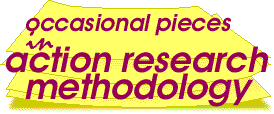
6 The ladder of inference

6 The ladder of inference
Speaking only for myself ...
Last occasional piece, I talked about the concept of the map not being the territory. In this piece, I mention a related concept: the ladder of abstraction or the ladder of inference.
It, too, was prominent in the writing of Alfred Korzybski. (His preferred term for it was "process of abstraction".) In his conception there were three foundation levels:
The event level consists of the world as it is. Influenced by the physics of the day, Korzybski thought of this as consisting of elementary particles whizzing aboutThe object level is what our perceptual apparatus extracts from the event level. We have no way of knowing how complete (or sometimes how accurate) our perceptions are. At the very least, we know they are incomplete.
The label level consists of the concepts we apply to the object level. We generalise, we categorise. Our language in a sense obliges us to do so, even if that does not well represent the perceptual experience.
As you might suspect, Korzybski recognised that there were many levels beyond these three, consisting of our higher-order abstractions.
As with the concepts of map and territory, S.I. Hayakawa made use of Korzbyski's ideas. In Language in thought and action he gives the following example, beginning with a cow:
- The cow known to science
- The cow we perceive
- The word "Bessie", a name given to a particular cow
- The word "cow", standing for the characteristics we have abstracted from a number of cows
- e.g. when Bessie is grouped as a member of "livestock"
- e.g. when Bessie is included among farm assets
- e.g. when Bessie is included among assets generally, not just farm assets
- The word "wealth".
[I've shortened the entries from Hayakawa's example.]
____
Copyright Bob Dick 1997-2000. May be copied if it is not included in any
material sold at a profit, and if this and the following notice are shownThis may be cited as: Bob Dick (1997) The ladder of inference.
Occasional pieces in action research methodology, # 6. Available
online at http://www.scu.edu.au/schools/gcm/ar/arm/op006.htmlVersion 1.2; Last modified 20000101
_____
These "occasional pieces" form part of a substantial action research site at Southern
Cross University. To access the "front page" of the site, click here